John George Howard
| John George Howard | |
|---|---|
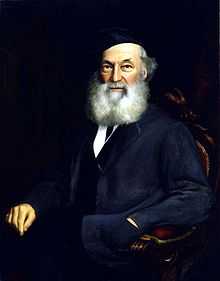 John George Howard | |
| Born |
July 27, 1803 Bengeo, Hertfordshire, England |
| Died |
February 3, 1890 Colborne Lodge, Toronto, Ontario |
| Nationality | Canadian |
| Occupation | Architect |
| Practice | William Ford |
| Buildings | Colborne Lodge |
John George Howard, (July 27, 1803 – February 3, 1890) born John Corby, was the City of Toronto, Canada's official surveyor and civil engineer. He was also the first professional architect in Toronto, architect of numerous public, commercial and residential buildings in Toronto in the 19th century and the principal donor of High Park to the people of Toronto.
Personal life
Born John Corby in Bengeo, Hertfordshire, England in 1803, Howard was the fourth of seven children of John and Sarah Corby. He attended a boarding-school in Hertford and spent two years at sea as a sailor before return to England to become a carpenter and joiner. In 1824, he entered the architecture profession, articling for three years to a London architect, William Ford, who became his brother-in-law, marrying Howard's older sister in 1825. Corby remained with Ford until his departure for Canada. In London, Howard met and married his wife Jemima Frances Meikle on May 7, 1827.
John and Jemima emigrated to Canada in 1832. It was at this time that Howard adopted the Howard surname. He himself gave two explanations. On February 11, 1834, when his change of name was revealed in a court case Howard wrote to Lieutenant Governor Sir John Colborne’s secretary, explaining that he was illegitimate, that when he was about 18 he had adopted the name Corby after the man his mother had subsequently married, and that he had assumed 'his proper name' when he left England. Later in life he claimed direct descent from Thomas Howard, the 4th Duke of Norfolk, through a 17th-century Howard who had adopted the name Corby from the ancestral estate Corby Castle, because of a family quarrel.
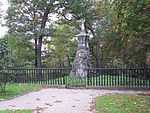
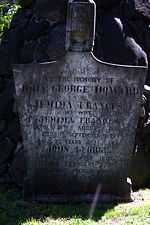
John and Jemima remained married until death, however John maintained a lifelong relationship with Mary Williams, with whom he had three children. John and Jemima themselves had no children. In 1877, Jemima died of cancer. Howard lived until 1890, dying at home at Colborne Lodge in High Park.[1] The Howards are buried in High Park; the monument is near to Colborne Lodge.
Professional career
Howard was an associate of William Ford from 1824–1832, with one notable engineering project working on the Cromford Canal in Derbyshire, England.
When Howard arrived in Toronto (at that time still the town of York) in 1833, he was the first professional architect in Toronto. His first public appointment was a teaching master at Upper Canada College (UCC), while developing an architectural practise. He remained affiliated with UCC until 1856. His practise thrived with commissions ranging from cottages to banks to public projects, including Queen's College of Kingston, Ontario, the King Street Gaol and the Provincial Lunatic Asylum in Toronto (modelled on the National Gallery (London)).
Howard started surveying work in 1836, become Toronto's official surveyor in 1843, a position he held until 1855. He surveyed Toronto harbour, laid out the 'Esplanade' on the waterfront, and subdivided the harbour's peninsula (now known as Toronto Island). He also did surveying work for cemeteries and private land sub-divisions. He also bought some land of his own, including the property now known as High Park, bought as a sheep farm and Sunnyside Farm to the east of the Park, now the site of St. Joseph's Health Centre. The area retains the nickname of 'Sunnyside'.
In 1873, in return for a yearly pension of $1,200, Howard deeded 120 acres (0.49 km2) of his High Park property to the city as a public park; the remaining 45 acres (180,000 m2) and Colborne Lodge became city property at his death. Howard was appointed forest ranger by the city in 1878, with responsibility for improving the park.
Works
| Building | Year Completed | Style | Location | Image |
|---|---|---|---|---|
| Thomas Mercer Jones Villa by John George Howard |
1833 | Regency | Toronto, Ontario | |
| William Henry Draper Villa by John George Howard |
1834 | Regency | Toronto, Ontario | |
| Canada Company Office built by John George Howard |
1834 | Regency | Frederick Street between King and Front, Toronto, Ontario | 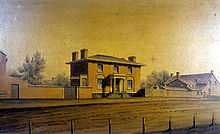 |
| Colborne Lodge John George Howard, |
1837 | Regency | Colborne Lodge Drive, just north of the Queensway - High Park, Toronto, Ontario | 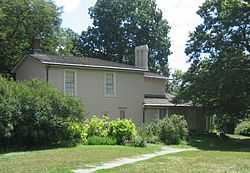 |
| Home District Gaol John George Howard, architect. |
1837–1841 demolished 1887 | Regency | Southeast corner of Front and Berkeley Streets, Toronto, Ontario | |
| James McDonell Store built by John George Howard |
1839 | Regency | Church Street, Toronto, Ontario | |
| Chewett's Block built by John George Howard |
1833 (demolished 1946 and now Standard Life Centre)[2] | Regency | southeast corner of York Street and King Street, Toronto, Ontario |  |
| Victoria Row - now Albany Club by John George Howard |
1840–1842; altered 1860s | Regency | 91 King Street East at Church Street, Toronto, Ontario | 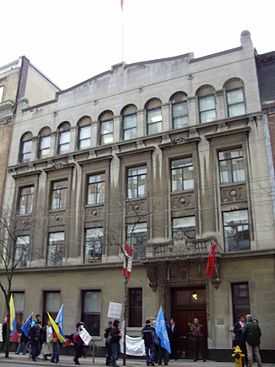 |
| Henry Bowyer Lane Homewood by John George Howard |
1846–1847 | Regency | Toronto, Ontario | |
| Bank of British North America built by John George Howard |
1856 | Regency | Yonge and Wellington Streets, Toronto, Ontario | |
| Union Mills, Weston built by John George Howard |
1860s | Regency | Lawrence Avenue West and Weston Road (Side Line and High Street), Toronto, Ontario | |
| Ontario Asylum built by John George Howard | 1860 (demolished 1970s) | Regency | Queen St, Toronto, Ontario | 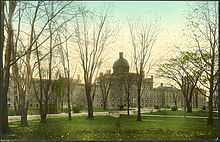 |
Paintings by John George Howard
-

High Park 1870s map by John George Howard
-
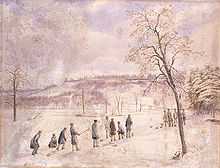
Curling in High Park 1836 by John George Howard
-
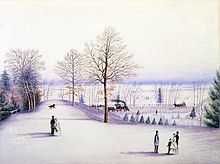
Looking south from Colborne Lodge 1870 by John George Howard
-

North side of King Street from Toronto to Church Streets by John George Howard
-

Third Parliament Buildings 1834 by John George Howard
References
- ↑ "JOHN AND JEMIMA HOWARD". City of Toronto. Retrieved October 17, 2008.
- ↑ http://torontofamilyhistory.org/simcoesgentry/26/chewett
External links
- "John George Howard". Dictionary of Canadian Biography Online. Retrieved October 17, 2008.
- Photo and information about Howard gravestone
| Wikimedia Commons has media related to John George Howard. |
|